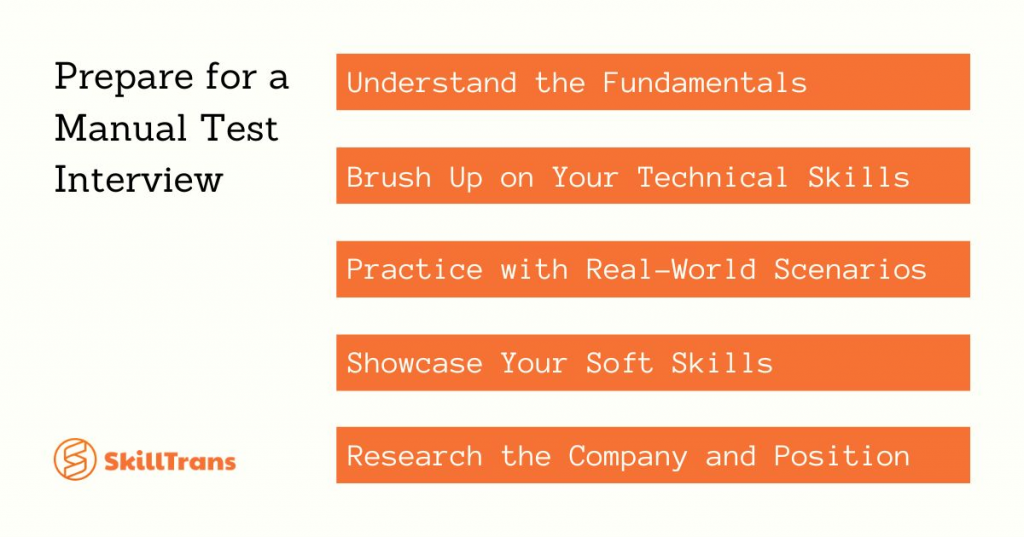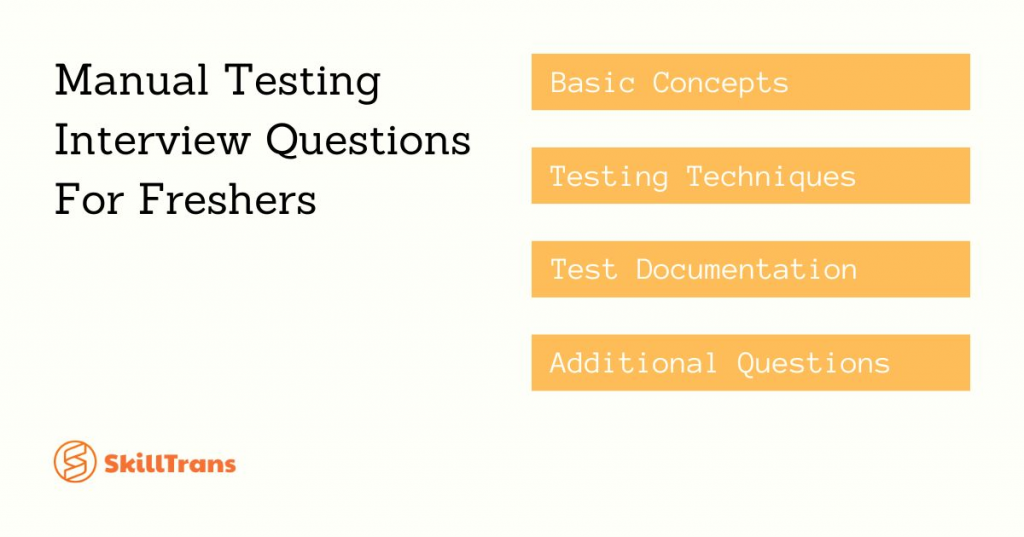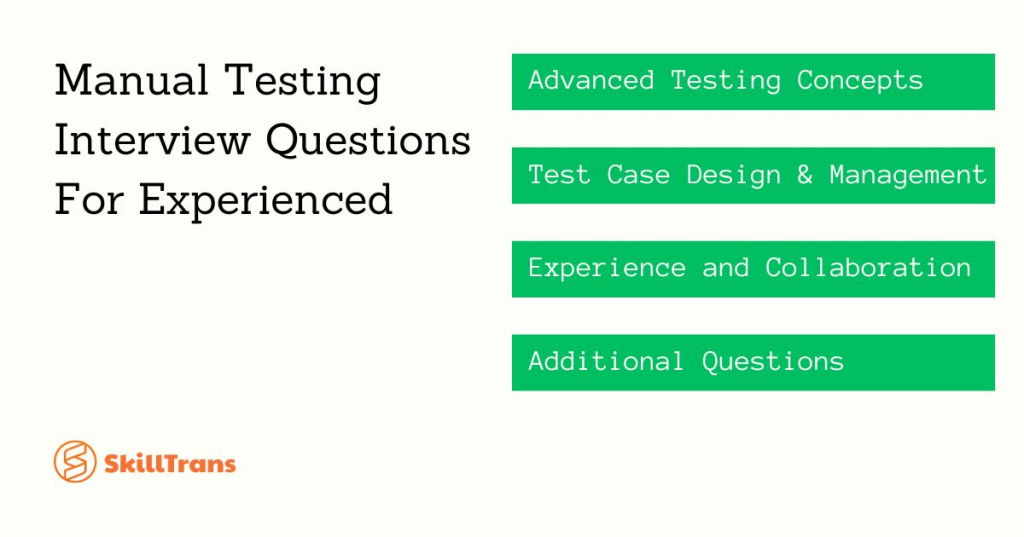Manual Testing Interview Questions (Freshers & Experienced)
In this post, we will provide a comprehensive guide to preparing for a manual testing interview, tailored for both freshers and experienced professionals.
We will cover the essential technical skills, soft skills, interview questions, and strategies needed to ace the interview and showcase your potential as a manual tester.
First, let's get into what to prepare for the manual testing interview.
Prepare for a Manual Test Interview

Preparing for a manual testing interview requires a multi-faceted approach that encompasses both technical knowledge and soft skills.
Here's a structured guide by SkillTrans to help you get ready:
Understand the Fundamentals
Software Testing Concepts: Get a solid grasp of the software development life cycle (SDLC), various testing levels (unit, integration, system, acceptance), and different testing types (functional, non-functional, black-box, white-box, etc.).
Testing Techniques: Familiarize yourself with common techniques like equivalence partitioning, boundary value analysis, decision tables, and error guessing.
Test Documentation: Know how to write clear and concise test cases, test plans, and bug reports.
Defect Life Cycle: Understand the process of defect identification, reporting, prioritization, fixing, and verification.
Brush Up on Your Technical Skills
SQL: Many testing scenarios involve database interactions, so having a working knowledge of SQL queries is beneficial.
Linux/Unix Commands: Familiarity with basic commands can help in navigating logs and test environments.
Test Management Tools: If you have experience with tools like Jira, TestRail, or HP ALM, be prepared to discuss your usage and the value they bring to testing.
Web Technologies: If you're interviewing for web application testing, understanding HTML, CSS, and basic JavaScript can be helpful.
Practice with Real-World Scenarios
Review Past Projects: Reflect on your previous testing experiences. Think about the challenges you faced, the solutions you implemented, and the lessons you learned.
Mock Interviews: Practice answering common interview questions with a friend or mentor. This will help you articulate your thoughts clearly and build confidence.
Online Resources: Numerous websites and forums offer practice test cases and interview questions. Utilize these resources to simulate real interview scenarios.
Showcase Your Soft Skills
Communication: Be able to explain technical concepts in simple terms, both verbally and in writing.
Problem-Solving: Demonstrate your ability to analyze problems, devise test strategies, and find effective solutions.
Attention to Detail: Highlight your meticulousness in identifying and reporting defects.
Teamwork: Emphasize your ability to collaborate with developers, business analysts, and other stakeholders.
Research the Company and Position
Company Website: Understand the company's products, services, and target audience.
Job Description: Analyze the required skills and qualifications for the specific role.
Glassdoor/LinkedIn: Look for insights from current or former employees about the company culture and interview process.
Remember, the key to acing a manual testing interview is a combination of theoretical knowledge, practical skills, and effective communication.
However, many times we cannot avoid being underprepared or not well prepared for the questions that employers ask.
SkillTrans will provide readers with questions when interviewing manual testing for both fresher and experienced. First, let's come to the question for freshers.
Manual Testing Interview Questions For Freshers

Here are 20 manual testing interview questions tailored for freshers, along with brief explanations to guide potential answers by SkillTrans:
Basic Concepts Interview Questions for Freshers
What is software testing? (Explain the purpose: finding defects, ensuring quality, meeting requirements.)
What are the two main categories of testing? (Manual and automated. Briefly touch on the differences.)
Why is manual testing important, even with automation? (Cover exploratory testing, user experience, and complex scenarios.)
What's the difference between a bug, an error, and a defect? (Simple definitions will suffice.)
What are the different stages of the software testing life cycle (STLC)? (List the phases and their significance.)
Testing Techniques Interview Questions for Freshers
What is black-box testing? Give an example. (Testing without knowing internal code. E.g., testing a website's functionality.)
What is white-box testing? Who usually does it? (Testing with code knowledge. Mainly done by developers.)
Explain the difference between positive and negative testing. (Valid vs. invalid input, expected vs. unexpected behavior.)
What is regression testing, and why is it important? (Retesting after changes to ensure existing features still work.)
What is exploratory testing? When might you use it? (Unscripted testing, good for uncovering unexpected issues.)
Test Documentation Interview Questions for Freshers
What is a test case? What are its essential components? (Steps, input, expected output, etc. Give an example.)
What is a test scenario? How is it different from a test case? (Broader goal vs. specific steps to achieve it.)
What is a test plan? What does it typically include? (Overall testing strategy. Mention scope, objectives, and resources.)
What is a defect report? What information should it contain? (Describes a found bug. Include steps to reproduce, severity, etc.)
What is the importance of documentation in manual testing? (Traceability, knowledge sharing, repeatability.)
Additional Questions Interview Questions for Freshers
What are some common challenges faced in manual testing? (Time constraints, human error, etc.)
How do you prioritize which tests to execute first? (Based on risk, critical functionality, etc.)
How do you keep up with the latest trends and technologies in testing? (Mention learning resources, blogs, and courses.)
Describe a situation where you found a particularly challenging bug. (Showcases problem-solving skills.)
What are your strengths and weaknesses as a manual tester? (Be honest and focus on areas for improvement.)
Above are the manual testing interview questions for freshers. Basically, the questions test basic knowledge about software testing without focusing much on strategy. If you are a candidate for the Fresher position, try to improve your knowledge of software testing well to have a successful interview.
Next, we will come to manual testing questions for experienced.
Manual Testing Interview Questions For Experienced

Here are 20 manual testing interview questions geared towards experienced candidates, delving deeper into their knowledge and experience by SkillTrans:
Advanced Testing Concepts For Experienced
How do you approach test estimation for complex projects? (Explain your process for breaking down tasks, considering dependencies, and identifying risks.)
What factors influence your decision to choose a specific test design technique? (Discuss equivalence partitioning, boundary value analysis, decision tables, etc., and when to use them.)
How do you handle testing for non-functional requirements like performance, security, and usability? (Describe tools and methodologies used, e.g., load testing, penetration testing, heuristic evaluations.)
Explain the concept of risk-based testing. How do you identify and prioritize test cases based on risk? (Discuss analyzing impact and likelihood, and how this affects test planning.)
What are the challenges of testing in an Agile environment? How do you adapt your testing approach? (Focus on continuous testing, collaboration, and fast feedback loops.)
Test Case Design and Management For Experienced
Describe your process for designing comprehensive test cases that cover both functional and non-functional requirements. (Highlight techniques for ensuring thoroughness and traceability.)
How do you maintain and update test cases as the software evolves? (Discuss version control, traceability matrices, and change impact analysis.)
What tools and techniques do you use for test case management and defect tracking? (Mention experience with JIRA, TestRail, etc., and how you leverage them for efficiency.)
How do you ensure the quality and effectiveness of your test cases? (Discuss peer reviews, test case optimization, and analysis of defect trends.)
Explain the concept of test data management. How do you create and maintain test data for various scenarios? (Mention techniques like data masking, synthetic data generation, and data refresh strategies.)
Experience and Collaboration For Experienced
Describe a situation where you had to troubleshoot a complex defect and how you resolved it. (Showcases analytical and problem-solving skills.)
How do you collaborate with developers, business analysts, and other stakeholders throughout the testing process? (Emphasize communication, feedback loops, and the importance of building relationships.)
How do you handle disagreements or conflicts regarding testing priorities or bug severity? (Highlight negotiation skills, data-driven decision-making, and finding win-win solutions.)
What experience do you have with test automation? How do you see manual and automated testing complementing each other? (Discuss your knowledge of automation frameworks and tools, and how you approach the balance between manual and automated testing.)
How do you mentor and train junior testers? What approaches do you use to share your knowledge and expertise? (Showcase leadership skills and your ability to build a strong testing team.)
Additional Questions For Experienced
What are some of the biggest challenges you've faced in manual testing, and how did you overcome them? (Demonstrates your ability to handle adversity and learn from experience.)
How do you stay up-to-date with the latest testing trends and technologies? (Mention your learning resources, participation in conferences or webinars, and willingness to adapt to new approaches.)
What are your career goals in manual testing? Where do you see yourself in the next few years? (Shows your ambition and commitment to the field.)
Describe a situation where you went above and beyond your role to ensure the success of a project or deliver exceptional results. (Highlights your dedication and initiative.)
What sets you apart as an experienced manual tester? What unique skills and perspectives do you bring to the table? (Focus on your strengths, achievements, and what makes you a valuable asset to the team.)
It can be seen that the questions for experienced people include a lot of questions about strategy, and even ask more about automation testing (they may ask you about automation testing, even though you are applying for a manual testing role).
Try to summarize the things you have done, give an overview of those things, and arrange them appropriately to answer the above questions in the most effective way.
Experience with Explanation Manual Testing Experience
Explaining your manual testing experience effectively involves showcasing your skills, knowledge, and accomplishments in a way that highlights your value to potential employers.
Here's a structured approach when you want to explain your manual testing experience:
Start with an Overview
Briefly describe your overall experience:
Number of years in manual testing
Industries you've worked in
Types of projects you've been involved with (web apps, mobile apps, enterprise software, etc.)
Testing methodologies you're familiar with (Agile, Waterfall, etc.)
Highlight Your Role and Responsibilities
Clearly state your specific contributions in past projects:
Test planning and strategy development
Test case design and execution
Defect tracking and reporting
Collaboration with developers and stakeholders
Test data creation and management
Any leadership or mentoring roles you've held
Showcase Your Technical Skills
Mention specific tools and techniques you've used:
Test management tools (JIRA, TestRail, etc.)
Defect tracking tools (Bugzilla, Mantis, etc.)
Testing frameworks and libraries
Programming languages (if applicable for scripting or automation)
Operating systems and environments you've worked with
Share Your Accomplishments and Results
Quantify your achievements whenever possible:
Number of bugs found and reported
Percentage of test coverage achieved
Improvements in software quality or release time
Positive feedback from colleagues or stakeholders
Any awards or recognition for your testing work
Provide Concrete Examples
Use the STAR method (Situation, Task, Action, Result) to describe specific scenarios:
Situation: Describe the context of a project or a specific challenge.
Task: Explain your role and responsibilities in that situation.
Action: Detail the steps you took to address the challenge or achieve the goal.
Result: Quantify the impact of your actions and highlight the positive outcome.
Demonstrate Your Soft Skills
Emphasize your communication and collaboration skills:
How you effectively communicate with team members and stakeholders (developer, marketing, etc.)
How you work collaboratively to resolve issues and meet deadlines
Your ability to adapt to changing requirements and priorities
Your problem-solving skills and attention to detail
Conclusion
In this comprehensive article, SkillTrans has equipped readers with a robust toolkit for acing manual testing interviews.
We've covered essential notes on manual testing concepts, provided a curated list of frequently asked interview questions tailored for both freshers and experienced candidates and offered valuable insights on how to effectively articulate your manual testing experience to potential employers.
By leveraging the information and guidance provided in this article, you'll be well-prepared to showcase your skills, knowledge, and passion for manual testing, increasing your chances of landing your dream job in the software quality assurance field.
Good luck with your manual testing interview!
In addition, SkillTrans has many courses in the field of software testing that you may be interested in, see more SkillTrans courses in Our Online Learning Catalog for All Levels!

Meet Hoang Duyen, an experienced SEO Specialist with a proven track record in driving organic growth and boosting online visibility. She has honed her skills in keyword research, on-page optimization, and technical SEO. Her expertise lies in crafting data-driven strategies that not only improve search engine rankings but also deliver tangible results for businesses.



